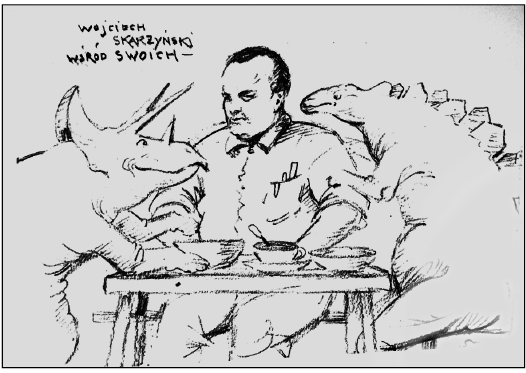

Wojciech Skarżyński (1932–2021)
Wojciech Skarżyński, widely known as Wojtek, was one of the most recognizable personalities within the Polish team of explorers in the Gobi Desert of Mongolia and Spitsbergen. He fell in love with the Mongolian landscape, animals, and people during the first Polish paleontological expedition in 1963. Wojtek expressed his strong feelings about this country in many ways, including organizing and taking part in several sporting events in Mongolia. His outstanding personality, artistic talents, logistical skills, and strength made him an indispensable member of all the expeditions of the Polish Academy of Sciences to the Gobi Desert between 1963 and 1971.
To understand Wojtek’s outstanding position among dinosaur explorers and employees of the Institute of Paleobiology of the Polish Academy of Science it is necessary to briefly outline his biography. He was born eight years before the Second World War in the then Polish town Stanisławów, Eastern Galicia. During the period of Nazi occupation (1939–1945), he suffered hard life conditions, and after the war his family was persecuted by the communist regime. Wojtek’s mother was imprisoned largely because of her belonging to a renowned family of artists. Her relatives were painters, writers, and poets widely known before the war for their patriotic activities. This upper–middle class heritage also hampered Wojtek’s educational opportunities under the communists as well as his initial attempts to find employment in post-war Poland.
Wojtek managed to graduate from the Forestry School, and in 1953 became a Forestry Ranger in the Bieszczady Mountains of southeastern Poland. By the end of the same year he was forced to quit this job and to join the army to be sent to an underground coal mine “Radzionków” as a physical worker. It was during that time of extremely harsh working and living conditions that he developed outstanding survival skills comparable to those described by the well known adage: “what does not kill us makes us stronger”. All who came in contact with Wojtek admired his physical and moral strength, positive attitude to life and friendly attitude to people and animals.
Finally in 1956, after a renewal of the political situation in Poland, Wojtek found a job suitable to his personality, abilities, and ambitions at the Department of Paleozoology (now Institute of Paleobiology) of the Polish Academy of Sciences. Initially he worked as a technical assistant of world-renowned paleontologist Professor Roman Kozłowski. Wojtek’s main occupation at that time was recovering graptolites and other microfossils from Paleozoic erratic boulders brought to Poland from Scandinavia by the glacier. He also took some courses in paleontology to become a qualified explorer for both invertebrate and vertebrate fossilized fauna.
The paleontological expedition to the Gobi Desert organized under the auspices of the Polish Academy of Sciences provided Wojtek with a great opportunity to demonstrate his skills and talents. The scientific leader of the expeditions, Professor Zofia Kielan-Jaworowska, and logistic leader Maciej Kuczyński greatly appreciated Wojtek’s tremendous contributions to the outstanding results of the dinosaur exploration. His main responsibility was to safely unearth the discovered dinosaur remains and to prepare them for transport. Skeletons had to be framed with wooden boards, forming large boxes and filled up with liquid gypsum (Plaster of Paris) to prevent destruction during transportation.
Wojtek’s family name has been introduced to dinosaur taxonomy as the specific name of the Late Cretaceous sauropod Opisthocoelicaudia skarzynskii discovered by the Polish-Mongolian Palaeontological Expedition to the Gobi Desert. The reason for such a distinction was Wojtek’s ingenious method of hanging up the extremely heavy bones of this gigantic animal at a sort of a scaffolding to be easily inspected and studied in all aspects.
Besides Wojtek’s work on the excavations and skeleton reconstruction he was also responsible for photographic documentation of the dinosaur findings at all the localities of the Polish-Mongolian Expeditions. As it happened, he also used his experience and talents to reconstruct the skeletons and to produce sculptures of dinosaurs to be exhibited in museums and environmental parks. One of the most successful has been the dinosaur exhibition in Chorzów Park, in Upper Silesia.
Not only was Wojciech Skarżyński an outstanding worker, explorer, traveler and sportsman, but also a great naturalist and friend. He had friends not only in our country and Mongolia but also in other countries outside Poland. He loved his family and cherished his friends and other people and supported virtually all living creatures, which he spared no effort to protect. Wojtek’s preoccupation with dinosaurs was appreciated by his family which is illustrated by his uncle Karol Kossak drawing of Wojtek with dinosaurs (Fig. 1). His integrity and moral standards were truly exceptional. He was profoundly decent man and he will be deeply missed by all his friends and all who came in contact with him.

Fig. 1. Drawing by Karol Kossak, entitled “Wojtek with his friends”.
Written by Tomasz Jerzykiewicz in Canada on August 7, 2021 and approved by Kazimiera Skarżyńska.
Paleontological aspects of the text have been corrected by Professor Magdalena Borsuk-Białynicka.
Tomasz Jerzykiewicz [tomjerzyk@fastmail.net], 51 Chemin de l’Athea, Saint Sauveur, Quebec, J0R 1R1 Canada.
Acta Palaeontol. Pol. 66 (3): 584, 2021
http://dx.doi.org/10.4202/app.00936.2021